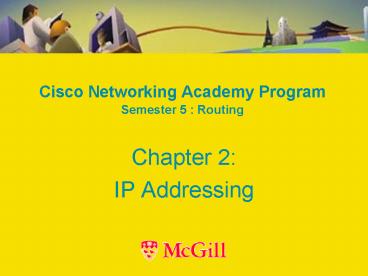Cisco Networking Academy Program Semester 5 : Routing - PowerPoint PPT Presentation
1 / 25
Title:
Cisco Networking Academy Program Semester 5 : Routing
Description:
A network and a host field determined by a subnet mask. Written in dotted decimals ... Classful protocols don't carry subnet masks. ... – PowerPoint PPT presentation
Number of Views:63
Avg rating:3.0/5.0
Title: Cisco Networking Academy Program Semester 5 : Routing
1
Cisco Networking Academy Program Semester 5
Routing
- Chapter 2
- IP Addressing
2
IP Addressing
- IPv4 Addressing
- IP Addressing Crisis and Solutions
- VLSM
- Route Summarization
- Private Addressing and NAT
- IP Unnumbered
- DHCP and Easy IP
- Helper Addresses
- IPv6
3
IPv4 Adressing
- 32 bits addresses
- Divided into 4 bytes
- A network and a host field determined by a subnet
mask - Written in dotted decimals
4
Address Classes
- Class D Multicast 224-239 (to a group of users)
- Class E Reserved for experimental purposes 240
and up - Broadcast 255.255.255.255
- Loopback 127.0.0.1
5
Subnet Masking
- Borrows bits to the host field of the address to
create sub-networks - Gives more flexibility
- Allows better control of broadcasts
- Network address calculated with subnet mask (AND)
6
Solution to Address Crisis
- IPv6 (128 bit addresses)
- Better use of existing IPv4
- VLSM
- Route Summarization
- Private Addressing and NAT
- IP Unnumbered
7
Limits To Classful Addressing
- Classful protocols dont carry subnet masks.
- Classful protocols (RIP ver.1, IGRP) arent
flexible. - Oversized routing tables
- Important waste of addresses
8
Limits To Classful Addressing
- (config) IP classless (default on ver.12.0)
allows routing of packets between remote subnets
of the same network)
(config) ip route 172.2.3.0 255.255.255.0
172.2.2.1
172. 2. 2. 0
(config) IP classless
172. 2. 2. 0
9
Classless Inter-Domain Routing (CIDR)
- Internet addresses are managed by the three
Regional Internet Registries (ARIN, RIPE NCC,
APNIC) - RIRs allocate address ranges (CIDR blocks)
regardless of classful boundaries - Uses summarization
- Reduces routing tables size, CPU cycles and
memory requirement.
10
Summarization
11
Summarization, Aggregation And Super-netting
- 3 terms, one meaning
- Super-netting is usually used for
- aggregation of contiguous Classful network
- Under the same administration
12
Class C Super-netting Example
- The company XYZ needs 400 addresses.
- Instead of using a whole class B, it uses only 2
contiguous class C networks.
13
Variable Length Subnet Masks (VLSM)
14
Classful And Classless Protocols
- RIP version 1
- does not send subnet mask information in its
updates. (no VLSM nor CIDR) - updates are broadcast increasing network traffic.
- does not support authentication.
- RIP Version 2
- sends subnet information (VLSM and CIDR),
- multicast routing updates (224.0.0.9), providing
better efficiency, - provides for authentication in its updates.
15
Summarization and Route Flapping
Summarization prevents the propagation of
multiple routing updates triggered by route
flapping
16
Private IP addresses
- Defined by RFC 1918
- Not routed on the Internet
- Used for LAN routing and on private Backbones
- Relies on NAT to reach public networks
17
Dealing with Discontiguous Subnets
- Issue with RIP Version 2 and EIGRP
- (config) no auto-summary
18
Network Address Translation (NAT)
- Defined by RFC 1631
- Translates private addresses into globally
significant ones. - NAT Overloading or Port Address Translation (PAT)
translates many privates addresses into a single
public one, using port numbers.
19
IP Unnumbered
- An interface borrows the IP Address of an other
interface.
20
DHCP
- Dynamic Host Configuration Protocol
- Provides IP configuration parameters to hosts
- More powerful than BootP
- Limited server available on Cisco IOS
21
Configuring DHCP
22
Cisco Easy IP
- Dynamically configures a WAN Interface over a
point-to-point connection - Provides LAN addresses to local network
- Provides NAT
23
Helper Address
- Changes a broadcast frame into the unicast
forwarded to the server address
24
Configuring IP Helper
Default forwarding
25
IP V.6
- 128 bits address format
- Expressed in hexadecimal
- Fields represent the different parts of a 4 level
hierarchy

